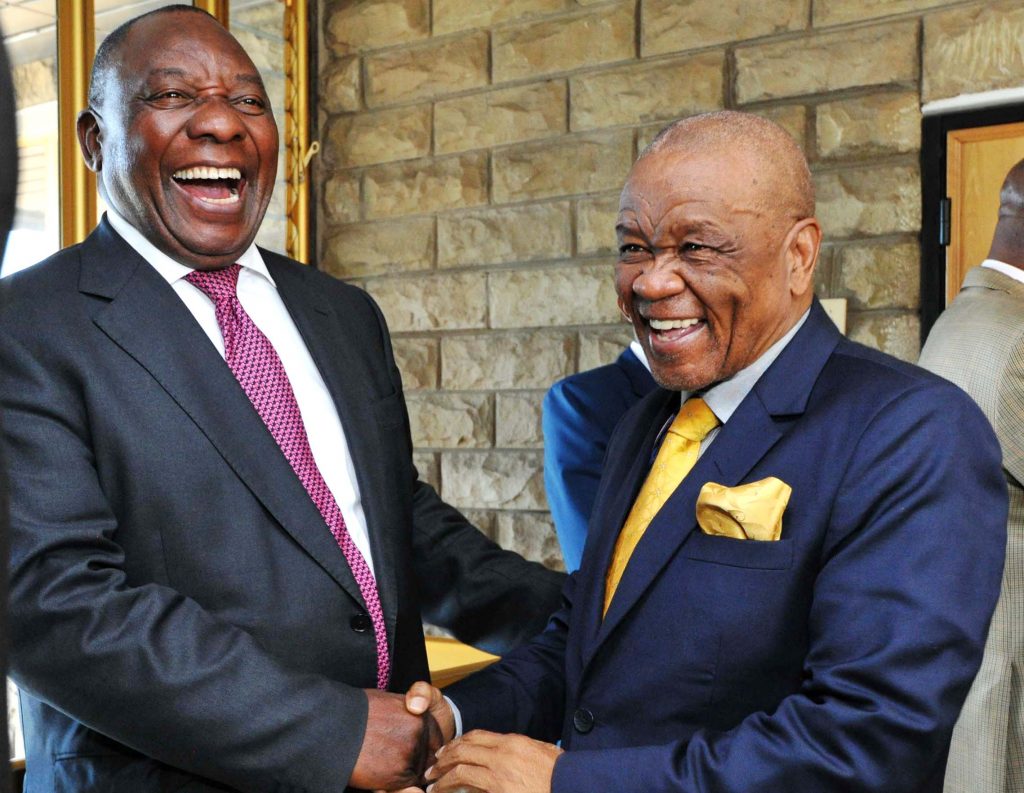Herbert Moyo
A SOUTH African non-governmental organisation has accused Water and Sanitation Minister, Nomvula Mokonyane of maladministration and delaying the implementation of the second phase of the Lesotho Highlands Water Project (LHWP Phase II).
The Organisation Undoing Tax Abuse (OUTA) says the delays in the implementation of the LHWP Phase II have resulted in cost overruns which could prejudice South African taxpayers to the tune of M7, 8 billion.
OUTA describes itself as “a proudly South African non-profit civil action organisation, comprising of and supported by people who are passionate about improving the prosperity of our nation”.
It gave the minister until today to respond their concerns or face legal action.
Ms Mokonyane has since issued a preliminary response to OUTA’s allegations by describing them as “a rehash of old allegations for which no evidence or proof have been advanced to substantiate them”.
“The Minister at once rejects with contempt the allegation that she has deliberately delayed the implementation of the LHWP Phase II and more-so that this was done in order to advantage certain preferred service providers.
“Phase 2 of the LHWP is targeted for completion in early 2025 with storage of water in the new
“Polihali Dam commencing in 2024. Efforts are being made to mitigate delays necessitated by the amendments to the procurement policies and the several changes in government in Lesotho over the last 5 years,” reads part the Ms Mokonyane’s recent response.
The LHWP is a multi-phased project to provide water to the Gauteng region of South Africa and to generate hydro-electricity for Lesotho. It was established by the 1986 Treaty signed by the governments of Lesotho and South Africa.
The project entails harnessing the waters of the Senqu/Orange River in the Lesotho highlands through the construction of a series of dams for the mutual benefit of the two countries.
Phase I of the LHWP, consisting of the Katse and Mohale dams, the ‘Muela hydropower station and associated tunnels was completed in 2003 and inaugurated in 2004. Phase II of the LHWP is currently in progress. It consists of two separate but related components: water transfer and hydropower generation.
The bilateral project which is estimated to cost at least M23 billion, is expected to provide about 3 000 jobs at the peak of its operations.
The water transfer component of Phase II comprises an approximately 165m high concrete faced rock fill Dam at Polihali downstream of the confluence of the Khubelu and Senqu (Orange) Rivers and an approximately 38km long concrete-lined gravity tunnel connecting the Polihali reservoir to the Katse reservoir. Other Phase II activities include advance infrastructure (roads, accommodation, power lines and telecommunication) and the implementation of environmental and social mitigating measures.
The hydropower component of Phase II, which is currently under further feasibility studies, may include a pumped storage scheme, conventional hydropower such as the expansion of the ‘Muela infrastructure or new greenfield sites.
Its exact form will be determined on completion of the further feasibility studies. Phase II is expected to be substantially complete by the end of 2024.
OUTA wrote to the minister on 19 July, 2017 demanding reports on the “progress of the LHWP II, financial records of the payments made to Lesotho in the form of royalties, a copy of the LHDA anti-corruption policy and the names of the persons and/or businesses found guilty of corruption in the implementation of Phase I”.
The also compiled a damning report on the LHWP II titled The Status Quo of the Lesotho Highlands Water Project Phase II.
The report was written and compiled by Helgard Muller, an independent Specialist Consultant in Water Policy, Regulations and Institutions and Julius Kleynhans, the Portfolio Director of Water and Environment at OUTA.
The report quoted former Department of Water Affairs Director-General, Professor Mike Muller saying, “That project is already seven years late and we need the minister to explain why her department is reducing Gauteng province’s water security and what she is going to do about it.”
Professor Muller exonerated Lesotho of any culpability for the delays in implementing the project, saying although South Africa’s cabinet had authorised the procurement of consultants months ago, tenders had still not been issued.
“While Lesotho was ready to proceed, South Africa was holding up the process. What is the problem? Is somebody trying to do a deal with this vital project? We cannot afford to put the security of Gauteng’s economy at risk like this,” Mr Muller said in the report.
Section 3.9 of the OUTA report tiled, Implications of the delays on LHWP II, states that “the actual engineering design work on the Polihali Dam and Tunnel will only start in the second half of 2017 then realistically assume another 12 months before designs are at such a stage that work can be put out to tender”.
“The programme allows for another 15 to 18 months of tender design and the tender period before a contractor can be on site. Add all this up and it is clear that the actual construction may not start until the middle of 2019.
“Based on the current progress in the awarding of tenders and applying realistic timelines for such a complex project it is not foreseen that the first water could be delivered before the third quarter of 2025. This will be seven years later than planned.”
OUTA concludes that the delays will have serious implications for the province of Gauteng which includes the commercial hub of Johannesburg.
Some of the implications include the risk of water shortages, cost overruns, economic restraint on development as well as the payment of far more royalties to Lesotho than initially anticipated.
“In the feasibility reports the cost of the project was estimated as M 17,372 billion (on December 2011).
“At the annual tariff consultation done in August 2016, the TCTA used an estimated capital cost of R 25,1 billion for LHWPII but clearly stated that the actual costs will only be known once the construction tenders had been awarded,” OUTA states in the report.
This would mean the delay has resulted in a cost escalation of M7, 8 billion.
“Implementation delays will make the project even more expensive- and eventually cost water users and taxpayers much more.
“Cost overruns can become a heavy burden on consumers in Gauteng and make the water from LHWP 2 unaffordable.
“The lack of an independent water and economic regulator for water pricing in South Africa means that unlike electricity where NERSA is doing its best to contain electricity prices it remains unclear how the LHWP II tariffs will be controlled and regulated,” OUTA concludes.
In her preliminary response Ms Mokonyane said the “LHWP Phase II is but one of the several interventions aimed at securing the water future of Gauteng”.
She said there were other interventions to ensure adequate water supplies for Gauteng included a programme to treat acid mine water which would yield results in 2019/20.
She has until today to give a full satisfactory response to OUTA or face legal action.



